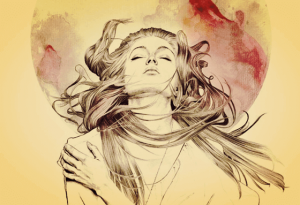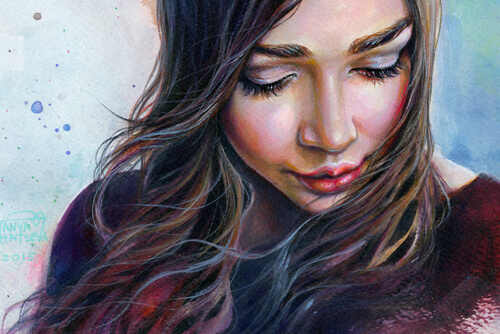Bravery and Suffering

Life isn’t always easy. In fact, it’s almost never simple, or at least that’s how it feels. The thing is that we hide most of our suffering from other people. Only we know the exact location of our wounds and how vulnerable they make us. Only we can heal them by picking up every one of our broken pieces and becoming stronger. Bravery and suffering go hand in hand.
Although living through an experience that breaks us apart inside is one of the most difficult things we have to face, it is also an opportunity. It gives us the chance to step back, evaluate how we understand the world, and, with time, rebuild ourselves. The question is, how do we do it?
“When we can’t change the situation we are facing, the challenge is to change ourselves.”
-Vicktor Frankl-
The weight of suffering
No one is safe from suffering. It is the strange guest that interrupts our lives from time to time, without warning or invitation. And though we usually try to run from it or hide it in the darkest basement and pretend it isn’t there, we can’t stop it from affecting us. It exercises its power even from that dark basement where we’ve banished it. And we might not notice its influence because the darkness makes it hard to anticipate or identify its movements.
The more time our suffering spends in the shadows, the more power it has over us
Some people hide their negative feelings with fake smiles. Other people fill their days with activities so they don’t any free time to think too much. Other still lie to themselves to try and put a band-aid on their discomfort. We’ve all done something like this, whether it is something that happens rarely or it has become a habit.
The problem is that no matter what kind of barriers we put up, suffering will come to the surface sooner or later. The consequences can be physical pain or emotional pain.

Suffering is part of life, whether we like it or not. The danger is when it becomes so heavy and prolonged and takes so many forms that it becomes a lifestyle. It clouds everything around us, making it appear dark grey, almost black.
In fact, most of the suffering that we feel (not all) develops from a painful experience. It is when we can’t stop living the loss of something or someone that we love. We don’t accept the loss. Instead, we resist it and try our best to make things different. When we do this, we are causing ourselves to suffer without realizing it. This suffering is pain, but at the same time, it is a refuge from the rain that begins in the midst of our grief and soaks us through to our bones with sadness.
The death of a loved one, the end of a relationship, the betrayal of a friend, or getting fired are some examples of loss that cause pain and suffering. It feels as if someone had stabbed us directly in the heart. These are wounds that will never stop bleeding if we don’t take care of them. They can turn into broken pieces that are hard to put back together.
A resilient dawn
While it is true that some people develop disorders or real problems that stem from their suffering, that’s not what usually happens. Some are even able to come out of their traumatic experience even stronger than before. These are experiences that cause them pain, but also help them to grow. One way or another, they are able to get some benefit from the experience.
A study by Wortman and Silver affirms that there are people who resist life’s beating with unexpected strength. The reason is their capacity for resilience. With resilience, they are able to maintain balance and avoid being overly affected by the trauma and pain in their daily lives.
This leads us to believe that we are stronger than we think. That even when our strength fails us, there is a tiny ray of light. It lights our way so we can pick up our broken pieces and put ourselves back together. This is the dawn of our resilience. It is the exact moment when our sorrows and the weight of our suffering give way to the healing power of our strength. It allows us to resist and remake ourselves.
“Although the world is full of suffering, it is also full of the overcoming of it.”

Instead of ignoring what we feel, we should accept it as a life lesson and go through it with our eyes wide open. It can take some getting used to, just like trying to see in the dark. Even when life knocks us down and nearly breaks us, the ability to feel strong helps us to overcome what we are going through. With it we can put our identity back together, picking up our broken pieces one by one.
That is resilience, one of the most beautiful abilities and something they should teach us all in school. Learning to heal our wounds, treat them with love and learn the best lesson we can from them. But how do we do it?
Picking up the pieces to rebuild ourselves
As we have seen, flourishing after a storm is possible, but not simple. It is a complex and dynamic process which, according to psychiatrist Boris Cyrulnikc, implies not only personal evolution but also the process of structuring a person’s own life story. There are some factors that we can develop to maximize our develop resilience and help us pick up our broken pieces, such as:
- Self-confidence and our ability to deal with confrontation.
- Accepting our emotions and feelings.
- Having a meaningful purpose in life.
- Believing that we can learn from negative experiences as well as positive ones.
- Having a support network.

In addition, Calhoun and Tedeschi, two of the authors who have done the most research about post-traumatic growth, point out that suffering and pain change us not only on an individual level but also in our relationships and in our life philosophy.
Confronting painful experiences is scary, but running away from them only prolongs our suffering. Avoidance causes them to mutate in a dangerous way. True courage means carrying on in spite of the fear, moving forward while our body trembles and falls to pieces on the inside.
In life, we need time to process our experiences and to be alone with our suffering. In these solitary moments, we are able to understand it. We learn that the important thing is to keep walking, whether we take big or small steps. The strongest person isn’t the one who never falls, but the one who can get up and keep moving, stronger because of the fall.
Life isn’t always easy. In fact, it’s almost never simple, or at least that’s how it feels. The thing is that we hide most of our suffering from other people. Only we know the exact location of our wounds and how vulnerable they make us. Only we can heal them by picking up every one of our broken pieces and becoming stronger. Bravery and suffering go hand in hand.
Although living through an experience that breaks us apart inside is one of the most difficult things we have to face, it is also an opportunity. It gives us the chance to step back, evaluate how we understand the world, and, with time, rebuild ourselves. The question is, how do we do it?
“When we can’t change the situation we are facing, the challenge is to change ourselves.”
-Vicktor Frankl-
The weight of suffering
No one is safe from suffering. It is the strange guest that interrupts our lives from time to time, without warning or invitation. And though we usually try to run from it or hide it in the darkest basement and pretend it isn’t there, we can’t stop it from affecting us. It exercises its power even from that dark basement where we’ve banished it. And we might not notice its influence because the darkness makes it hard to anticipate or identify its movements.
The more time our suffering spends in the shadows, the more power it has over us
Some people hide their negative feelings with fake smiles. Other people fill their days with activities so they don’t any free time to think too much. Other still lie to themselves to try and put a band-aid on their discomfort. We’ve all done something like this, whether it is something that happens rarely or it has become a habit.
The problem is that no matter what kind of barriers we put up, suffering will come to the surface sooner or later. The consequences can be physical pain or emotional pain.

Suffering is part of life, whether we like it or not. The danger is when it becomes so heavy and prolonged and takes so many forms that it becomes a lifestyle. It clouds everything around us, making it appear dark grey, almost black.
In fact, most of the suffering that we feel (not all) develops from a painful experience. It is when we can’t stop living the loss of something or someone that we love. We don’t accept the loss. Instead, we resist it and try our best to make things different. When we do this, we are causing ourselves to suffer without realizing it. This suffering is pain, but at the same time, it is a refuge from the rain that begins in the midst of our grief and soaks us through to our bones with sadness.
The death of a loved one, the end of a relationship, the betrayal of a friend, or getting fired are some examples of loss that cause pain and suffering. It feels as if someone had stabbed us directly in the heart. These are wounds that will never stop bleeding if we don’t take care of them. They can turn into broken pieces that are hard to put back together.
A resilient dawn
While it is true that some people develop disorders or real problems that stem from their suffering, that’s not what usually happens. Some are even able to come out of their traumatic experience even stronger than before. These are experiences that cause them pain, but also help them to grow. One way or another, they are able to get some benefit from the experience.
A study by Wortman and Silver affirms that there are people who resist life’s beating with unexpected strength. The reason is their capacity for resilience. With resilience, they are able to maintain balance and avoid being overly affected by the trauma and pain in their daily lives.
This leads us to believe that we are stronger than we think. That even when our strength fails us, there is a tiny ray of light. It lights our way so we can pick up our broken pieces and put ourselves back together. This is the dawn of our resilience. It is the exact moment when our sorrows and the weight of our suffering give way to the healing power of our strength. It allows us to resist and remake ourselves.
“Although the world is full of suffering, it is also full of the overcoming of it.”

Instead of ignoring what we feel, we should accept it as a life lesson and go through it with our eyes wide open. It can take some getting used to, just like trying to see in the dark. Even when life knocks us down and nearly breaks us, the ability to feel strong helps us to overcome what we are going through. With it we can put our identity back together, picking up our broken pieces one by one.
That is resilience, one of the most beautiful abilities and something they should teach us all in school. Learning to heal our wounds, treat them with love and learn the best lesson we can from them. But how do we do it?
Picking up the pieces to rebuild ourselves
As we have seen, flourishing after a storm is possible, but not simple. It is a complex and dynamic process which, according to psychiatrist Boris Cyrulnikc, implies not only personal evolution but also the process of structuring a person’s own life story. There are some factors that we can develop to maximize our develop resilience and help us pick up our broken pieces, such as:
- Self-confidence and our ability to deal with confrontation.
- Accepting our emotions and feelings.
- Having a meaningful purpose in life.
- Believing that we can learn from negative experiences as well as positive ones.
- Having a support network.

In addition, Calhoun and Tedeschi, two of the authors who have done the most research about post-traumatic growth, point out that suffering and pain change us not only on an individual level but also in our relationships and in our life philosophy.
Confronting painful experiences is scary, but running away from them only prolongs our suffering. Avoidance causes them to mutate in a dangerous way. True courage means carrying on in spite of the fear, moving forward while our body trembles and falls to pieces on the inside.
In life, we need time to process our experiences and to be alone with our suffering. In these solitary moments, we are able to understand it. We learn that the important thing is to keep walking, whether we take big or small steps. The strongest person isn’t the one who never falls, but the one who can get up and keep moving, stronger because of the fall.
This text is provided for informational purposes only and does not replace consultation with a professional. If in doubt, consult your specialist.







